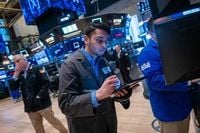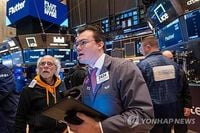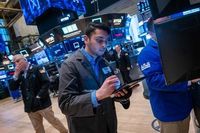Global financial markets are reeling from a dramatic announcement made by former President Donald Trump on April 2, 2025, regarding the imposition of reciprocal tariffs on major trading partners, including South Korea. This decision has sent stock indices tumbling and sparked fears of a renewed trade war.
Following Trump's declaration, the KOSPI in South Korea opened at 2437.43, down 2.73% or 68.43 points from the previous session. The KOSDAQ also faced a decline, starting at 670.75, down 2.06% or 14.10 points. Major companies, particularly those heavily involved in exports such as Samsung Electronics, SK Hynix, and Hyundai Motor, saw their stocks drop significantly, with Samsung down 2.38%, SK Hynix down 4.6%, and Hyundai down 3.06%. The South Korean Won also weakened, opening at 1471 won per dollar, an increase of 4.4 won from the previous day.
In Japan, the Nikkei 225 index fell by more than 3% and at one point dropped over 4%, marking its lowest level since August 2024. Toyota's stock plummeted by more than 6%, reflecting the widespread impact of the tariffs on export-driven companies.
Trump's announcement included a 25% reciprocal tariff on South Korean imports, which is set to take effect at 0:01 on April 9, 2025. The tariffs are not limited to South Korea; the U.S. government has also imposed tariffs on the EU (20%), China (34%), Japan (24%), India (26%), South Africa (30%), Switzerland (31%), Indonesia (32%), and Vietnam (46%). Furthermore, a basic tariff of 10% will be applied to imports from 60 other countries.
As the news broke, U.S. stock index futures also showed sharp declines. The Dow Jones Industrial Average futures fell by 2.7%, the S&P 500 futures dropped by 4%, and the Nasdaq 100 futures plummeted by 4.7%. In after-hours trading, tech giants like Tesla and Apple faced significant losses, with Tesla's stock falling by over 8% and Apple's by more than 7%. This downturn has raised concerns about a potential crash in the stock market when trading resumes.
According to Han Ji-young of Kiwoom Securities, the tariffs were stricter than anticipated. "The market expected a more lenient approach, but Trump's tariffs were much higher than what was forecasted," she noted. As of April 3, 2025, E-Mini S&P 500 futures were trading at 5,515.75, down 3.44%, while E-Mini Nasdaq 100 futures were at 18,917.00, down 4.26% from the previous session.
In a statement, Trump characterized the tariffs as a declaration of economic independence for the U.S., announcing a blanket 25% tariff on imported cars and varying rates for other countries. The tariffs were significantly higher than the market's initial expectations of around 20%. This has led to a sell-off in tech stocks, with Apple, Nvidia, and Tesla all seeing declines of 4% or more.
Market analysts are predicting that this tariff announcement will further deepen the adjustment of technology stocks, which are particularly vulnerable due to their high reliance on global supply chains. Ahn So-eun, a researcher at KB Securities, indicated that the market reacted negatively to the higher-than-expected tariffs, causing a sharp decline in after-hours trading.
As investors brace for the impact of these tariffs, there is speculation about how negotiations between the U.S. and affected countries may unfold. Han Ji-young pointed out the possibility of tariff rates changing through negotiations before the retaliatory tariffs take effect. This sentiment was echoed by Scott Bessett, who suggested that the announced tariffs could serve as a ceiling, with countries likely to take measures to lower their rates.
Despite the immediate turmoil in the markets, some analysts believe that a long-term bearish trend is unlikely. "Short-term drops are expected, but the likelihood of a prolonged downturn due to this tariff announcement is low," said Han Ji-young. She emphasized that the ongoing negotiations could lead to a gradual increase in stock prices as tariff levels are adjusted.
In the wake of this market upheaval, Kiwoom Securities experienced technical issues with their trading services, causing delays in order executions. Investors reported problems with order prices not matching expectations and difficulties in modifying orders. The disruptions lasted for about an hour after the market opened, but services have since been restored. Kiwoom Securities is currently investigating the root cause of the issue.
As the situation continues to develop, investors and market watchers are closely monitoring the responses from both the U.S. government and affected countries. The unfolding events will likely keep the stock markets in a state of volatility as traders adjust to the new realities brought on by Trump's tariff strategy.



![[속보]‘미 상호 관세’ 여파에 코스피 2.7% 급락 출발, 원·달러 환율 오름세](https://thumbor.evrimagaci.org/3BLNPb5OUygguDyCgN8yJMstLmY=/200x0/tpg%2Fsources%2F9f0d7525-bdd8-4105-84a0-8898cf335d3b.jpeg)

![[美 상호관세] 나스닥 선물 급락…"예상보다 높은 관세 강도"](https://thumbor.evrimagaci.org/xykTKhV2FREbjqMa2GwesNSOnEk=/200x0/tpg%2Fsources%2F644d1f31-5ccc-487b-8934-39985288430d.jpeg)



